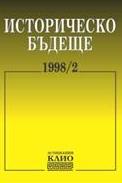Източните подходи на император Ираклий в светлината на съвременните извори
The Eastern Campaigns of Emperor Heraclius in the Light of Contemporary Sources
Author(s): Vesselina VachkovaSubject(s): History
Published by: Асоциация Клио
Keywords: Byzantine foreign policy; Emperor Heraclius; Chosroes II; Roman-Catholic Itinera Hierosolymitana; Crusades
Summary/Abstract: In modern historiography, the eastern campaigns of Emperor Heraclius (610–640) are sometimes referred to as "crusades". Studies dedicated to Byzantine foreign policy, however, need to be based on precise terminology. Scholars who favor the crusade theory, derive their arguments from some features commonly shared by Heraclius' campaigns against Chosroes II (614–629) and the later Roman-Catholic Itinera Hierosolymitana Indeed, there are certain elements in Heraclius' campaigns which ostensibly remind us of the theories and practices of the Crusades. Above all, there was a religious element to the Byzantine campaigns against the Persians that could be compared to the Western attitudes toward the Eastern "unbelievers" which emerged in the latter half of the eleventh century. These similarities, however, should not be overestimated. On the basis of a thorough analysis of the contemporary Byzantine sources of Heraclius' reign, one could reach the following conclusions: a/ there was no substantial difference, from a Byzantine point of view, between the military campaigns against the Slavs and the Avars, on one hand, and the Persians, on the other; b/ Heraclius' campaigns against Persia were seen as being the final stage in a lasting conflict that had started long ago; and, as far as the clash between the Sun-worshippers and the Christians is concerned, the conflict reached its most dramatic phase not under Chosroes II but under Shapur II (309–380); c/ in Heraclius' day, the war on Persia did not receive any spiritual sanction by the Church and the participants in the eastern campaigns were not given any additional, religious stimuli for fighting the Persians; d/ in the contemporary sources, there is no evidence that Heraclius attempted to free Jerusalem, recover the Holy Cross for the Christians, or forcibly convert "the unbelievers" to Christianity. Thus, any attempt at mechanical exemption of Heraclius' wars against Persia from the common background of the struggles to defend the Empire of the New Rome proves to be ill-grounded.
Journal: Историческо бъдеще
- Issue Year: 1998
- Issue No: 2
- Page Range: 31-38
- Page Count: 8
- Language: Bulgarian
- Content File-PDF

